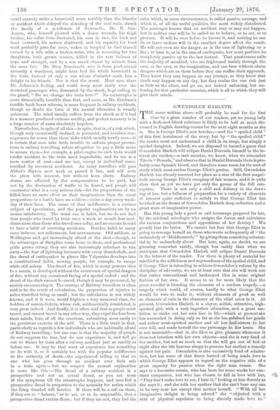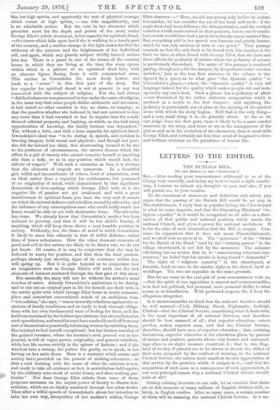GWEND OLEN H ARLETH.
THE name written above will probably be read for the first time by a great number of our readers, yet no young lady with a flesh-and-blood existence is likely to be half as much dis- cussed in English drawing-rooms for the next eight months as she is. She is George Eliot's new heroine,—and the " spoiled child " of this first instalment of the story, but by "the spoiled child" the reader must not understand a child in its teens, but simply a spoiled daughter. Indeed, we are disposed to hazard a guess that Gwendolen Harleth will eclipse Daniel Deronda himself in the in- terest she excites,—a rash surmise, we know, when we remember Tito in " Romola," and observe that in Daniel Deronda there is pro- bably some Spanish blood, and therefore some room for the sort of study which most excites George Eliot's genius. Still, Gwendolen Harleth has already asserted her place as a star of the first magni- tude among George Eliot's company of fair women, and it is quite clear that as yet we have got only the germs of the full con- ception. There is not only a shill and delicacy in the draw- ing of her, but a fullness of preparation for a variety of elements of interest quite sufficient to satisfy us that George Eliot has lavished on the dream of Gwendolen Harleth deep reflection and a great store of imaginative power.
Has this young lady a good or evil horoscope prepared for her, by the spiritual astrologer who assigns the forces and calculates the various conjunctions and oppositions of her destiny ? We greatly fear the latter. We cannot but fear that George Eliot is going to revenge herself on those who wrote so frequently of "the melancholy of ,Middlemarch," by giving them something substan- tial to be melancholy about. But here, again, no doubt, we are guessing somewhat rashly, though less rashly than when we anticipate that Gwendolen Harleth will eclipse Daniel Deronda in the interest of the reader. For there is plenty of material for mischief in the selfishness and waywardness of the spoiled child, and if George Eliot is intending to achieve Gwendolen's reform by the discipline of adversity, we are at least sure that she will work out that rather conventional and hackneyed idea in some original fashion of her own. It seems to us far more likely that the great novelist is blending the elements of a modern tragedy,—a tragedy which could, of course, hardly be what George Eliot would be sure to make it, without elements of good as well as elements of ruin in the character of the chief actor in it. At present, Gwendolen Harleth is a elver, selfish, attractive, high- spirited girl, with a vei imperfect education, and a great am- bition to strike out her own line in life—which at present she has succeeded in doing only so far as she has subdued her gentle and rather weak-spirited mother and all her half-sisters to her own will, and made herself the one personage in her home. She is not unarniable—that is, she likes to give pleasure whenever it does not interfere with her own objects—and she is very fond of her mother, but not so much so that she will get out of bed at night after she has become sleepy to procure her mother a remedy against her pain. Gwendolen is also excessively fond of admira- tion, but has some of that fierce hatred of being made love to which George Eliot appears to regard as the negative side of a great capacity for passion when the right man comes. She says to a favourite cousin, who has been for some weeks her con- stant companion, but who has chosen to fall in love with her, "Pray don't make love to me, I hate it," looking at him fiercely as she says it; and she tells her mother that she can't bear any one to be very near her except that mother herself. "With all her imaginative delight in being adored" she "objected with a sort of physical repulsion to being directly made love to."
She has high spirits, and apparently the sort of physical courage which comes of high spirits, — can ride magnificently, and is an admirable archer. But the vein in her character which promises most for the depth and power of the story under George Eliot's subtle treatment, is her capacity for spiritual dread, —the terror which falls upon her if she is walking in a lonely part of the country, and a sudden change in the light makes her feel the wideness of the universe and the helplessness of her individual self, and again, which any ghastly subject vividly treated strikes into her. There is a panel in one of the rooms of the country house in which they are living at the time the story opens, Within which is a picture of an upturned dead face, with an obscure figure fleeing from it with outstretched anus. This excites in Gwendolen the most lively horror, and leads to a " scene " in this first part of the story. But her capacity for spiritual dread is not at present in any way connected with the subject of religion. For she had always "disliked whatever was presented to her under the name of religion, in the same way that some people dislike arithmetic and accounts ; it had raised no other emotion in her, no alarm, no longing ; so that the question whether she believed it, had not occurred to her, any more than it had occurred to her to inquire into the condi- tions of colonial property and banking, on which, as she had many opportunities of knowing, the family fortune was dependent." Yet, without a faith, and with a keen capacity for spiritual dread, Gwendolen's ideal was "to be daring in speech, and reckless in braving dangers, both moral and physical ; and though her prac- tice fell far behind her ideal, this shortcoming seemed to be due to the pettiness of circumstances, the narrow theatre which life offers to a girl of twenty who cannot conceive herself as anything else than a lady, or as in any position which would lack the tribute of respect." With such a character as this, it is obvious that the elements of tragedy are numerous. In a beautiful girl, wilful and inconsiderate of others, fond of admiration, with an ideal rather than a capacity for recklessness, but possessed of no originality of mind, while characterised by that significant detestation of love-making which George Eliot tells us is the negative life of passion not yet awakened, and with a great sensitiveness to spiritual fears, you have the very sort of nature on which the inward defiance and rebellion caused by adversity, and the influence of any unscrupulous man who could really reach her heart, would be able to act with destructive force. The adversity has come. We already know that Gwendolen's mother has been reduced to poverty, and that it will be her child's beauty, if anything, which will keep them above a very humble position in society. Evidently, too, the frame of mind in which Gwendolen is likely to meet this calamity is that of wilful defiance, rather than of brave submission. How the other dormant elements of good and evil in her nature are likely to be drawn out, we do not yet know. Of course, it is easy to conjecture that she may be induced to marry for position, and that then the fatal passion, perhaps already just showing signs of its existence within her, will spring up. But it is quite beyond us to conjecture how an imagination such as George Eliot's will work out the rich elements of interest scattered through the first part of this story.
But assuredly the story will not be without the author's usual touches of satire. Already Gwendolen's aspirations to be daring, and to cut out an original part in life for herself, are dealt with in the satiric spirit with which George Eliot loves to touch common- place and somewhat conventional minds of an ambitious tone. " Gwendolen," she says, " was as inwardly rebellious against the re- straints of family conditions, and as ready to look through obliga- tions with her own fundamental want of feeling for them, as if she had been sustained by the boldest speculations; but she really had no such speculations, and would at once have marked herself off from any sortof theoretical or p ractically reforming women by satirising them. She rejoiced to feel herself exceptional ; but her horizon was that of the genteel romance, where the heroine's soul, poured out in her journal, is full of vague power, originality, and general rebellion, while her life moves strictly in the sphere of fashion ; and if she wanders into a swamp, the pathos lies partly, so to speak, in her having on her satin shoes. Here is a restraint which nature and society have provided on the pursuit of striking adventure ; so that a soul burning with the sense of what the universe is not, and ready to take all existence as fact, is nevertheless held captive by the ordinary wire-work of social forms, and does nothing par- ticular." Nor does George Eliot refrain from some of those poignant sarcasms on the unjust power of beauty to disarm true criticism, which are so thickly scattered through her other works. Thus after a wilful speech of Gwendolen's about her intention to take her own way, irrespective of her mother's wishes, George
Eliot observes :—" Here, should any young lady incline to imitate- Gwendolen, let her consider the set of her head and neck ; if the- angle there had been different, the chin protrusive, and the cervical vertebrm a trifle more curved in their position, ten to one Gwendo- len's words would have had a jar in them for the sweet-natured Rex. But everything odd in her speech was humour and pretty banter, which he was only anxious to turn to one point." That passage reminds us that the only fault to be found with this number is the fault we have so often found with George Eliot, that she here and there affects the pedantry of science where the pedantry of science is particularly discordant. The satire of this paesage is rendered jarring, though not a bit the sharper, by the pedantic term cervical vertebrm,' just as the very first sentence in the volume is dis- figured by a query as to what gave "the dynamic quality" to Gwendolen's glance,—where the "dynamic quality" is very tall language indeed for the quality which makes people stir and wake up under any one's look. Such a phrase has a pedantry of effect —not diminished by the rather elaborate composition which is. prefixedas a motto to the first chapter ; and anything like pedantry is particularly out of place at the opening of the spirited scene with which the story begins. Still that is the only thing— and a very small thing it is—to grumble about. As far as we can judge from the first part, there is likely to be a more careful structure in the story, and more of art in the management of the plot as well as in the evolution of the characters, than is usual with George Eliot, and certainly not less than usual of imaginative force- and brilliant criticism on the paradoxes of human life.







































 Previous page
Previous page